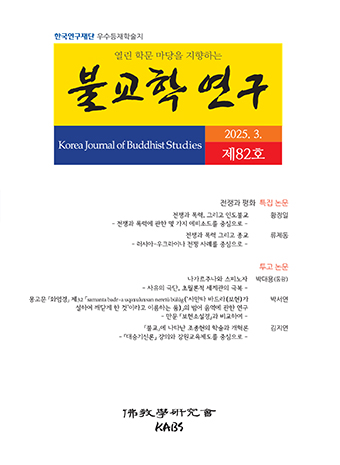Abstract
References
Sorry, not available.
Click the PDF button.
Information
In this paper, I demonstrated that poets of Baekjo associates in 1920s had induced various poetic images, mingling with the Buddhistic imagination that had long been the soil of the Korean culture, in the course of seeking a literary way out at that time under the grand premise of Romanticism, ‘Return to nature.' The religious sensibility stretches over their poems. Which is seen to have been derived from the attitude of securing and sustaining the 'lost country' within the confines of literature, from the shutout of the times when there was no other means of seeking for succor than in literature, and by defining them as artists for Art's sake more than anything else. All through the paper, it is demonstrated that the meanings of this religious susceptibility is grasped centered on their viewpoint of life, much part of which is related to speculation of Pure Land and nationalistic consciousness.The romantic recognition that literature is the expression of natural emotion and the self-awakening on the stream of modern literature that the rhetoric realization is the literary characteristic, both, are the two core factors that form the aesthetic of Baekjo colleagues. Though their poetic feeling flew out from Romanticism that has a deep affinity with Buddhistic cogitation, what solidified it was, however, the aesthetic consciousness and rhetoric The area where the aesthetic consciousness of Baekjo associates is most convergently expressed is that in which life is established as the pivotal factor. Which is founded with the various discussions in the process that Romanticism is set rightly up in the literary soil of Korea as the modern current.What lies especially meaningful in the research is their peculiar approach toward nature. Their Motherland is cautiously hidden in their poems as the shelter of Korean race who were suffered. It can be understood that what they sang the beauty of the mountains and rivers of their own land is caused by what Romanticism as the modern flow was deeply taken in and furthered, but more ultimately, it was confirmed as the product from the uniquely historical experience of colonization and the critical awareness in modern times of obliterating lives. At this point, their poetry shows a more unique standpoint surpassing nature as the reflection of romantic idea, which was scrutinized in association with “the Pure Land” in Buddhism. The romantic Utopia of Baekjo poets contains a characteristic notion of “the Pure Land” that dream and reality fuses into one, under the suppression of colonization in which a conflict should arise with the contradiction of modernity. The symbol of the moon which is variously described in their poems symbolizes not only the metaphor that simply reveals the romantic sensibility, but that chosen in the insight of times toward modernity representing that of the sun. And all this forms a juncture with the Buddhistic sentiment, and soar out, riding the crest of waves of the times entangled like a whirlwind by, both, the progressive optimism symbolized by the sun and nostalgic unconsciousness by the moon.The aesthetic cogitation that is researched in this paper, in relation to the ideas of Pure Land aims to the restoration of self-identity erased in the misconstrue history so-called the control under colonization, and heads more for the life founding the Buddhistic reasoning. This has something to do with the instinctively responsive battling with the humane value against the rationalistic value of sterile modernity and was born from the interwinding of self-aspiring to construct the modern literature, simultaneously. The literature to the associates of Baekjo was the “country in their song” which they could find to return in one piece. What swung open-widely the gateway of the nation was the ideology so-named Romanticism, and the native sensitivity like Buddhism intervenes into it productively. The Buddhistic emotions being soaked in all parts of their poems is not-drying wick that set on fire of beautiful poetic soul of the Korean literature history and is an aesthetic long breathing in the heart of Korean people. It is the spontaenous manifestation of the aesthetic of the poetry of Baekjo colleagues that it longed for the identity of racial literature along with the summons of the times in which the modern literature should be founded is tightened to look for its original seat where the romantic ideology was reflected. They were, however, the avant-gardes of 1920s, who rejected to imitate the tradition in a simple way, and constructed the modern literature in a fresh and challenging posture.
Click the PDF button.
- Publisher :Korean Association of Buddhist Studies
- Publisher(Ko) :불교학연구회
- Journal Title :Korean Journal of Buddhist Studies
- Journal Title(Ko) :불교학연구
- Volume : 6
- Pages :337~376


 Korean Journal of Buddhist Studies
Korean Journal of Buddhist Studies






